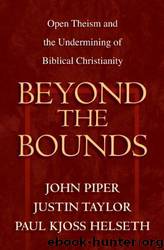Beyond the Bounds: Open Theism and the Undermining of Biblical Christianity Paperback by John Piper & Justin Taylor & Paul Kjoss Helseth

Author:John Piper & Justin Taylor & Paul Kjoss Helseth
Language: eng
Format: mobi, epub
Tags: Religion
ISBN: 9781581344622
Publisher: Crossway
Published: 2003-01-29T22:00:00+00:00
9 Gregory A. Boyd, “The Open-Theism View,” in Divine Foreknowledge: Four Views, ed. James K. Beilby and Paul R. Eddy (Downers Grove, Ill.: InterVarsity Press, 2001), 43.
10 See A. B. Caneday’s discussion in chapter 5 of this volume of how openness theologians equivocate on the word “literal.”
BeyondTheBounds.44627.i04.qxd 8/6/07 9:15 AM Page 279
The Trustworthiness of God and the Foundation of Hope
279
knows the future perfectly, just as it is; partly as settled, partly as open.
So, some things about the future are a “maybe,” not a “certainty,”
even to God.
Why do I believe this? Because I simply can’t make sense of the
Bible without it. Yes, the Bible clearly reveals that God is certain of many things that are going to take place ahead of time. But the Bible also reveals that some things about the future are open possibilities, even to God.11
Openness theologians deny the exhaustive, definite foreknowledge
of God, then, because they are convinced that faithfulness to Scripture demands it. They do so as well for philosophical reasons, for they are persuaded that traditional resolutions of the omniscience-creaturely freedom problem are untenable philosophically. Why? To begin with, openness theologians believe, much like Aristotle before them, that if the propositions that God believes about future contingents have
truth-value—if, in other words, the propositions that God believes about future free actions convey what must in fact happen—then the consequence of that knowledge is fatalism.12 The consequence, in
other words, is that human and angelic beings are reduced to robots that lack the ability to engage in significantly free activity.13 To avoid this conclusion, and to preserve the notion that morally responsible beings are truly “self-determining” agents, openness theologians therefore maintain that propositions about future contingents are neither true nor false, but rather become true or false when agents with self-11 “Boyd Summarizes Open View, Responds to Recent Dialogue,” Clarion: The Newspaper of Bethel College 75, no. 4 (13 October 1999): 3. For a devastating critique of Boyd’s exegesis and interpretive method, see A. B. Caneday, “The Implausible God of Open Theism: A Response to Gregory A. Boyd’s God of the Possible,” Journal of Biblical Apologetics 1 (2000): 66-87.
Pinnock insists that the open “model” of God is “more biblical” than the traditional model ( The Openness of God, 101-125). See also David Basinger, “Can an Evangelical Christian Justifiably Deny God’s Exhaustive Knowledge of the Future?” Christian Scholar’s Review 25 (1995): 133-145; and Richard Rice, “Biblical Support for a New Perspective,” in Pinnock, et al., The Openness of God, 11-58. For an incisive response to Rice’s contention that “love is the first and last word in the biblical portrait of God” (ibid., 18), see Mark R. Talbot, “God’s Vocation, Our Vocation,” Modern Reformation 8, no. 3 (May/June 1999): 15-20. Like Jonathan Edwards before him, Talbot persuasively argues that “God’s ‘vocation’ . . . is to manifest his own glory”
(ibid., 19).
12 Cf. Aristotle’s Categories and Propositions (De Interpretatione), translated with Commentaries and Glossary by Hippocrates G. Apostle (Grinnell, Ia.: The Peripatetic Press, 1980), 113-117. I am indebted to Ronald Nash for pointing out the connection between Aristotle and open theism.
Download
Beyond the Bounds: Open Theism and the Undermining of Biblical Christianity Paperback by John Piper & Justin Taylor & Paul Kjoss Helseth.epub
This site does not store any files on its server. We only index and link to content provided by other sites. Please contact the content providers to delete copyright contents if any and email us, we'll remove relevant links or contents immediately.
The Secret Power of Speaking God's Word by Joyce Meyer(3184)
Signature in the Cell: DNA and the Evidence for Intelligent Design by Stephen C. Meyer(3132)
Real Sex by Lauren F. Winner(3016)
The Holy Spirit by Billy Graham(2944)
The Gnostic Gospels by Pagels Elaine(2527)
Jesus by Paul Johnson(2352)
Devil, The by Almond Philip C(2326)
23:27 by H. L. Roberts(2248)
The Nativity by Geza Vermes(2227)
Chosen by God by R. C. Sproul(2161)
All Things New by John Eldredge(2160)
Angels of God: The Bible, the Church and the Heavenly Hosts by Mike Aquilina(1964)
The Return of the Gods by Erich von Daniken(1943)
Angels by Billy Graham(1922)
Knowing God by J.I. Packer(1855)
Jesus of Nazareth by Joseph Ratzinger(1811)
The Gnostic Gospel of St. Thomas by Tau Malachi(1794)
Evidence of the Afterlife by Jeffrey Long(1786)
How To Be Born Again by Billy Graham(1778)
